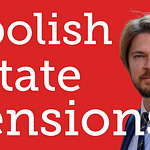In this Institute of Economic Affairs podcast, Managing Editor Daniel Freeman interviews Professor Donald Boudreaux, who is a professor of economics at George Mason University, a senior fellow at the Mercatus Center, and a member of the IEA’s Academic Advisory Council. The conversation focuses on Boudreaux’s new book, The Triumph of Economic Freedom: Debunking the Seven Myths of American Capitalism, co-authored with former U.S. Senator Phil Gramm. They discuss why these economic myths persist and how they distort policy debates in both the United States and the United Kingdom.
The interview examines several key myths, starting with the claim that the Industrial Revolution impoverished workers. Professor Boudreaux presents evidence showing that real wages, living standards, and life expectancy began rising for ordinary workers in Britain no later than the 1840s, and possibly as early as the mid-18th century. They discuss the so-called Engels pause and why workers voluntarily moved from the countryside to urban factories, voting with their feet for better economic prospects. The conversation also tackles the debate around tariffs and protectionism, particularly addressing claims that 19th century American prosperity was built on high tariffs rather than economic freedom and open immigration policies.
The discussion concludes with an analysis of the China shock and manufacturing job losses in America. Professor Boudreaux presents research showing that regions affected by increased Chinese trade are actually better off today than before, and that approximately 87% of manufacturing job losses come from labour-saving technology rather than trade. He challenges the national security argument for tariffs, noting that broad-based tariffs like those imposed by recent US administrations hit allies just as hard as adversaries. Throughout the conversation, they emphasize how economic myths continue to shape misguided policies despite overwhelming evidence to the contrary.











